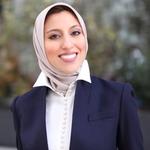Hijabi of the Month March - Ranya Shbeib
Lifestyle
|
Mar 27, 2017
|
4 MIN READ


When did you start wearing hijab? Tell us a little about your journey, how you came to wear it, what factors were involved, etc.
I started wearing hijab right before my 14th birthday. I grew up in northern California and never really thought about wearing hijab. At the time I started to consider wearing it, I was surrounded by really wonderful women that were able to answer my questions on hijab in a way that appealed to me. My biggest concern at the time was if I decide to wear hijab, I did not want to remove it later. I made a lot of dua for this before I made my decision.
Tell us more about your work as a Muslim foster parent. How did you first get involved?
When I learned there were Muslim children in the foster care system I knew I had to get involved. When first placed in foster care, the majority of Muslim children immediately request a Muslim family; however, they are almost always placed in foster homes of other faiths because there are so few licensed Muslim foster homes. I felt these kids were no different than my own children, and that I had an obligation to them. It’s easy to make a financial donation, but to open your home and welcome a child to your family is really what makes an impact. Through our journey, we realized a lot of work needed to be done to support the Muslim foster children and the foster families that care for them. For this reason, we started the Muslim Foster Care Association.
What are some of the greatest challenges and greatest joys you've experienced as a foster parent?

What would you say to someone considering becoming a foster parent?
I would say make sure your whole family is on board. It is a commitment for the whole family. You will face challenges and need to be strong and united in order to confront trials and adapt. Know that not everyone will support you, but knowing that you are doing something for the sake of Allah will make any difficult task seem feasible. Know that you will be everything to your foster child. You will be their advocate, their parent, their friend, their teacher, their counselor, and more. Know that with all this, being a foster parent is incredibly rewarding!

What is your favorite hadith of the Prophet (S) and why?
My favorite hadith is, “There are seven persons whom Allah will shade on a day when there is no shade but His. They are a just ruler, a young person who grew up in the worship of Allah, a person whose heart is attached to the mosques, two people who love each other and who meet and depart from each other for the sake of Allah, a man whom a beautiful woman of high status seduces but he rejects her by saying I fear Allah, a person who spends in charity and conceals it such that his right hand does not know what his left hand has given, and a person who remembered Allah in private and he wept.” The fundamentals of Islam consist of the importance of doing good deeds along with our relationship with God and humanity and demonstrating good character, all of which are encompassed in this hadith.
If you could tell your 18-year-old self one thing, what would it be?

If you could give one piece of advice to someone struggling with hijab, what would it be?
Hijab is an act of worship prescribed in the Quran and Sunnah. It includes modesty in character and clothing. We all are human, we all have struggles, and for some hijab is a struggle. I would tell the person struggling to turn to Allah and seek guidance from Allah. Allah knows us best and loves us the most. I would also like to direct my advice to the men. They have an important role in supporting their wives, mothers, sisters, and all women who wear hijab. They have a role in encouraging the women in their lives to wear hijab. The men have a responsibility to women and will be held accountable for their words and actions of influence.
Want to find out more about the Muslim Foster Care Association? Email Ranya at RShbeib@gmail.com to learn more!
Save
Subscribe to be the first to know about new product releases, styling ideas and more.
What products are you interested in?

